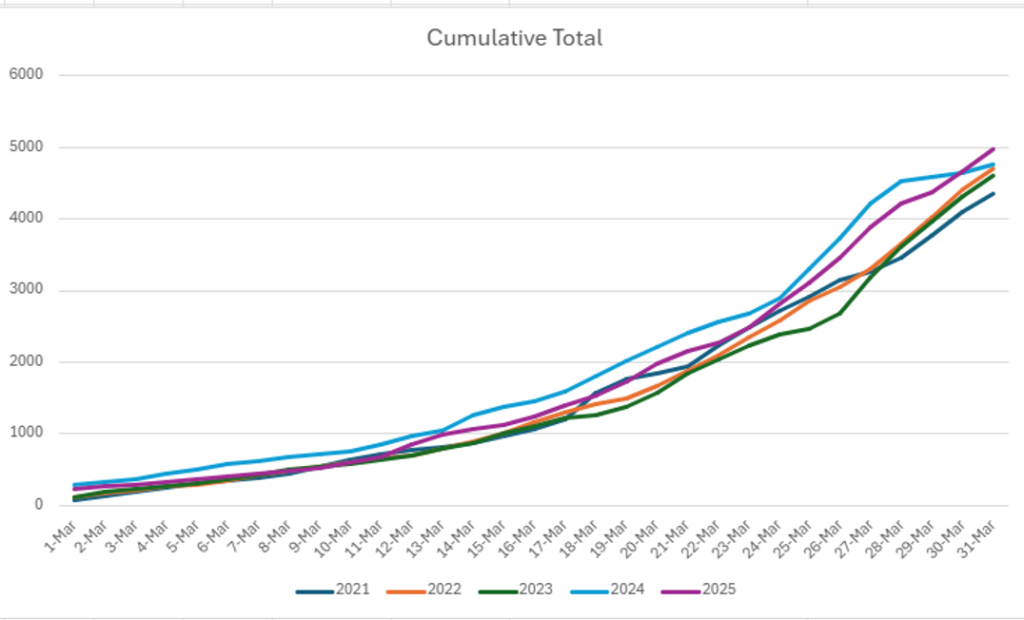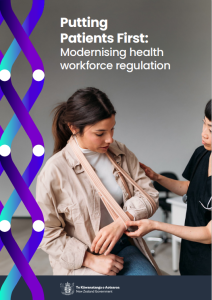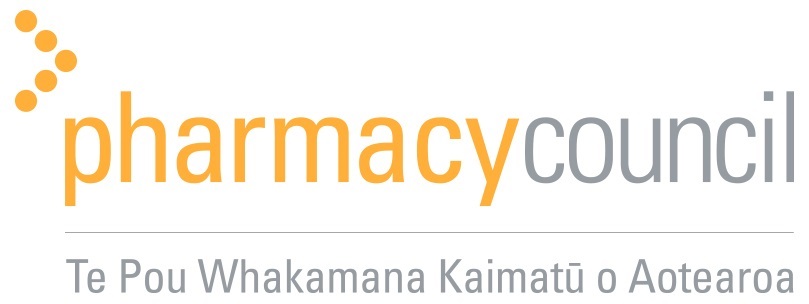
FROM THE COUNCIL CHAIR AND CE
REFLECTIONS FROM THE DEPARTING CHAIR
UPDATE FROM THE CE
I am very pleased to confirm that Ming-chun Wu was elected as the new Pharmacy Council Chair in the March Council meeting, with Mariana Hudson elected as Deputy Chair.
Ming-chun has previously held the role of Deputy Chair and brings a new perspective to the Council through her background in education and extensive governance experience. I look forward to working with Ming-chun and Mariana as we head into the new financial year.
You will have seen the Ministry of Health advertising for nominations to the Pharmacy Council. Nominations closed in March, and the Ministry is now working through the appointment process. We will hear more about this in due course.
I also encourage you to have your say in the public consultation on health workforce regulation. This is an important consultation, with the potential for wide ranging changes and we need to ensure that pharmacy regulations remain clear, consistent and tailored to support all pharmacists in New Zealand. You can read more about it and find the consultation link below.
Ngā mihi
Michael Pead
Chief Executive
IMPORTANT FOR YOU TO KNOW
COUNCIL ELECTION RESULTS
At Council’s meeting in March, an election was held for the positions of Council Chair and Deputy Chair. The election is held at the beginning of each year and is a statutory requirement under the Health Practitioners Competence Assurance Act 2003. While Council members are appointed by the Minister of Health, Council members are responsible for electing the Chair and Deputy Chair positions from within Council.
Ming-chun Wu, a Chartered Director with the Institute of Directors who has over 18 years’ experience in transforming and improving organisations was elected as Council Chair. Ming-chun was appointed to the Pharmacy Council in 2019 and has previously held the role of Deputy Chair.
Mariana Hudson, a community pharmacist and president of Ngā Kaitiaki o Te Puna Rongoā – the Māori Pharmacists’ Association, was elected as Deputy Chair. Mariana was appointed to the Pharmacy Council in November 2021.
Read the bios of all our Council members on the Pharmacy Council website.


Ming-chun Wu, Chair, and Mariana Hudson, Deputy Chair
APC APPLICATIONS
Thanks to everyone who got their Annual Practicing Certificate applications in before 31 March. We processed over 5020 applications, with almost 500 applications coming in on Thursday 27 March alone!

Cumulative total of applications received each day
What happens if I haven’t made an application by 31 March?
If we didn’t receive your application and fee by 31 March, on 1 April we changed your practising status to registered, inactive. Remember that you are not able to legally practise in New Zealand as a pharmacist until you are issued with an APC (even if your role does not involve direct patient contact). If you still need to send in your application, please do it as soon as possible.
If for any reason you will not be practicing this year, you can transfer to inactive (non-practising) status or ask to be removed from the register. You can find more information and the registration status flowchart on our website.
From mid-April, we start a process called “register revision”, which helps to maintain the accuracy of the register. We send out reminders in May and November to anyone who has not put in an application and if a pharmacist has still not made contact by January 2026 their name will be removed from the register.
WELLBEING RESOURCES FOR PHARMACISTS
We all know that it’s important to reduce stress and look after our mental wellbeing, but when you’re under pressure in a busy pharmacy it can feel like an impossible task.
We have had queries about useful pharmacy-specific resources, so have pulled together information that you can either use in your own day or to support conversations with your staff and team members about any stress, worry or anxiety they may be experiencing.
The Pharmacy Council has a document that discusses workplace pressures in pharmacy. Although this is an older document, it has practical advice and resources that are still relevant today. You can find it here – Workplace Pressures in Pharmacy.
The Pharmaceutical Society of New Zealand has a wellness hub for members on its website with several useful local and international resources tailored to people working in health. You can find the hub here – Wellness Hub: PSNZ.
The Mental Health Foundation also has a comprehensive list of helplines available on its website – Helplines | Mental Health Foundation.
While there may be no quick fix for the stresses and challenges facing pharmacists today, implementing some wellbeing practices into your routine can help to prevent you from becoming overwhelmed.
OUR ENGAGEMENT JOURNEY
PSNZ SESSION WITH COUNCIL
Michael Hammond, President of the Pharmaceutical Society of New Zealand (PSNZ) and Helen Morgan-Banda, Chief Executive of PSNZ, joined the Pharmacy Council meeting recently for a joint session between the two organisations. The Council found it to be a productive and positive session, with constructive discussion on some of the big issues pharmacists are currently facing.
“Working closely with membership groups like the Pharmaceutical Society of New Zealand helps us at the Pharmacy Council to take a proactive approach to regulation, making sure that the regulatory tools we use actively support pharmacists to practise safely and competently,” said Michael Pead, CE of the Pharmacy Council.
REGULATORY PATHWAY
Our Strategic Plan is the framework we use to drive our work and make sure we meet our statutory obligations under the Health Practitioners Competence Assurance Act 2003 (the Act). It is a framework we use all the time, but it was last updated in 2019 so we are reviewing and refreshing the document to confirm our focus for the next five years.
Background
The Act specifies 13 functions we are expected to undertake, such as prescribing qualifications, authorising the registration of pharmacists, and setting the standards of clinical competence, cultural competence, and ethical conduct pharmacists must observe.
This means that the bulk of our work is activities to meet the Act and will only change in relation to changes in the Act.
What are we refreshing?
We have two objectives under the Act – to minimise risk of harm to the public from pharmacist practice and to maximise pharmacists’ competence and fitness to practise – and we use seven strategies to achieve these objectives.
While the objectives and strategies are not changing, there is still a lot we can do to make sure we are working effectively and looking at new ways to ensure our regulatory framework is robust, fit for purpose and responsive to current and future pharmacy practice.
Next steps
It’s important that our work reflects what is happening in the profession, so in early March we had a collaborative hui with all the professional associations to discuss the first iteration of this refreshed Strategic Plan, or Regulatory Pathway as we are calling it. We’ve taken feedback on board, and you will hear more on this in the coming months.
EOI: WORKING GROUP ON THE INNOVATIVE STATEMENT
As the role of pharmacists and pharmacist prescribers expands to meet the growing healthcare needs in our communities, the Pharmacy Council has started work on a draft positional statement that will aim to support innovative practice.
The Council is seeking an expression of interest (EOI) from pharmacists, who want to be part of the working group, with:
- Good understanding of the health sector priorities for innovative service and/or,
- Experience designing/ implementing sustainable innovative services and/or,
- Experience of safe delivery of in-scope innovations, including education/ professional development support, employment support, coaching, peer support and mentoring.
The total time commitment is approximately 3 to 4 hours, via virtual hui in the evenings.
If you are interested in being part of the working group, please email [email protected] with a brief description of your experience of innovative practice/ service design/ implementation.
KEEPING YOU UP TO DATE
PUBLIC CONSULTATION ON IMPROVING HEALTH WORKFORCE REGULATION
On Friday 28 March the Minister of Health announced a public consultation on health workforce regulation. 
The consultation contains important questions on the role of regulation in encouraging overseas-trained professionals to work in New Zealand, the length of training pathways, and how patients can be more involved in regulatory processes.
The aim of the current regulation is to ensure that health practitioners are competent and fit to practise. This means that anyone in New Zealand can trust that their health practitioner meets all the required clinical, cultural and ethical standards to practise safely, and that there are mechanisms in place to protect patient safety.
Responsible Authorities play a specific but narrow role in the wider health system, and do not have a mandate to determine what services are needed, or how those services should be delivered or funded. Expanding the mandate for regulation could have the unintended consequence of diluting the priority of patient safety.
This consultation signals changes that would have significant impact on all Responsible Authorities. There is scope for greater efficiency and collaboration between regulators, overseen by a Ministry well-resourced for stewardship and oversight.
Pharmacists have not always been recognised for the crucial role they play in supporting the health and wellbeing of New Zealanders, and we encourage you to consider how amalgamation or significant change to the regulation could affect health professions managing high risk of harm levels.
Health regulation should protect and strengthen every part of the health system, and anyone working within a health profession should be able to trust that training and standards have been endorsed by people with relevant experience and clinical expertise.
You can find out more and read the discussion document on the Ministry of Health website: Putting Patients First: Modernising health workforce regulation.
We are currently working on a submission from the Pharmacy Council, which we will make public once it has been submitted. The consultation closes on 30 April at 11.59 pm.
PHARMACIST PRESCRIBER SCOPE OF PRACTICE REVIEW SUMMARY
 Pharmacist Prescribers are experienced clinical pharmacists who can prescribe medicines to patients as part of a collaborative health team.
Pharmacist Prescribers are experienced clinical pharmacists who can prescribe medicines to patients as part of a collaborative health team.
There are now over 100 Pharmacist Prescribers registered in New Zealand, and we wanted to make sure that the prescriber scope of practice is working as it needs to. In December 2024, we sought feedback from selected partners on proposed changes, following a review of the prescriber scope.
The review reinforced the rationale for the current safeguards and confirms the need for greater sector collaboration to help support less experienced pharmacist prescribers professionally and in practice.
Most of the respondents supported keeping the prescriber practice plan as a structured way to manage prescribing practice (‘a safety net’), especially for new prescribers. All pharmacist prescribers are accountable for their prescribing decisions and must take ownership of their practice plan.
Respondents also strongly recommended that pharmacist prescribers share their draft practice plans with an experienced peer to ensure that there are no “blind spots” in their development and incorporate any feedback or suggestions that they may have in the updated plan.
The responses were broadly supportive of the registration requirements for the scope, including a minimum of three years’ experience working in a collaborative health team. The Council does not require a postgraduate diploma as an entry requirement for the prescribing programme as this is a university requirement. Respondents generally advocated for this qualification for collaborative practice and prescribing, as necessary to safely manage expansion of prescribing practice. Depending on a pharmacist prescriber’s experience and qualifications, Council may place conditions on their scope of practice to oversee expansion of practice.
Respondents didn’t propose changes for the recertification requirement for pharmacist prescribers, though many recommended that the MyRecert verifier should be another pharmacist prescriber who is familiar with prescribing practice.
We are currently working through the review recommendations and will update the Pharmacy Council website with more information.
NZ PHARMACY SECTOR LEADERS FORUM - COMMON PURPOSE STATEMENT
At the beginning of April, the newly formed New Zealand Pharmacy Sector Leaders Forum (PSLF) released a common purpose statement.
This common purpose statement sets out a unified future for pharmacy which will enable excellent patient care. A statement from the forum said, “By working collaboratively, we will represent the pharmacy sector to drive positive change across sustainability, help deliver a well-resourced and supported workforce where equity is fundamental. We are also committed to enabling the pharmacy workforce to deliver better patient outcomes by working at the top of scope in all settings, incorporating innovation and new developments in medicine.”
You can read the Common Purpose Statement and find out more information on the PSNZ website.

